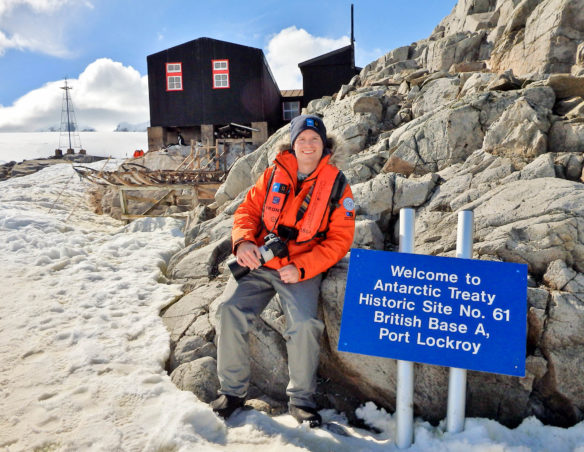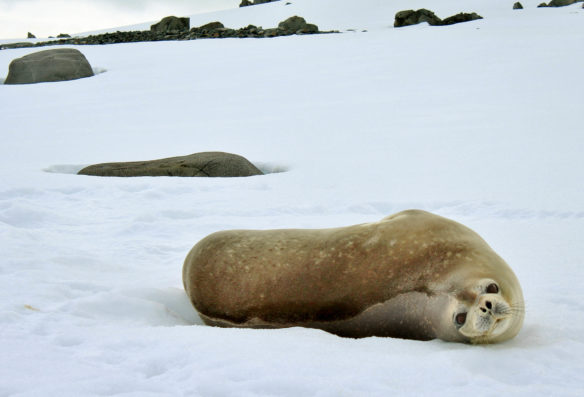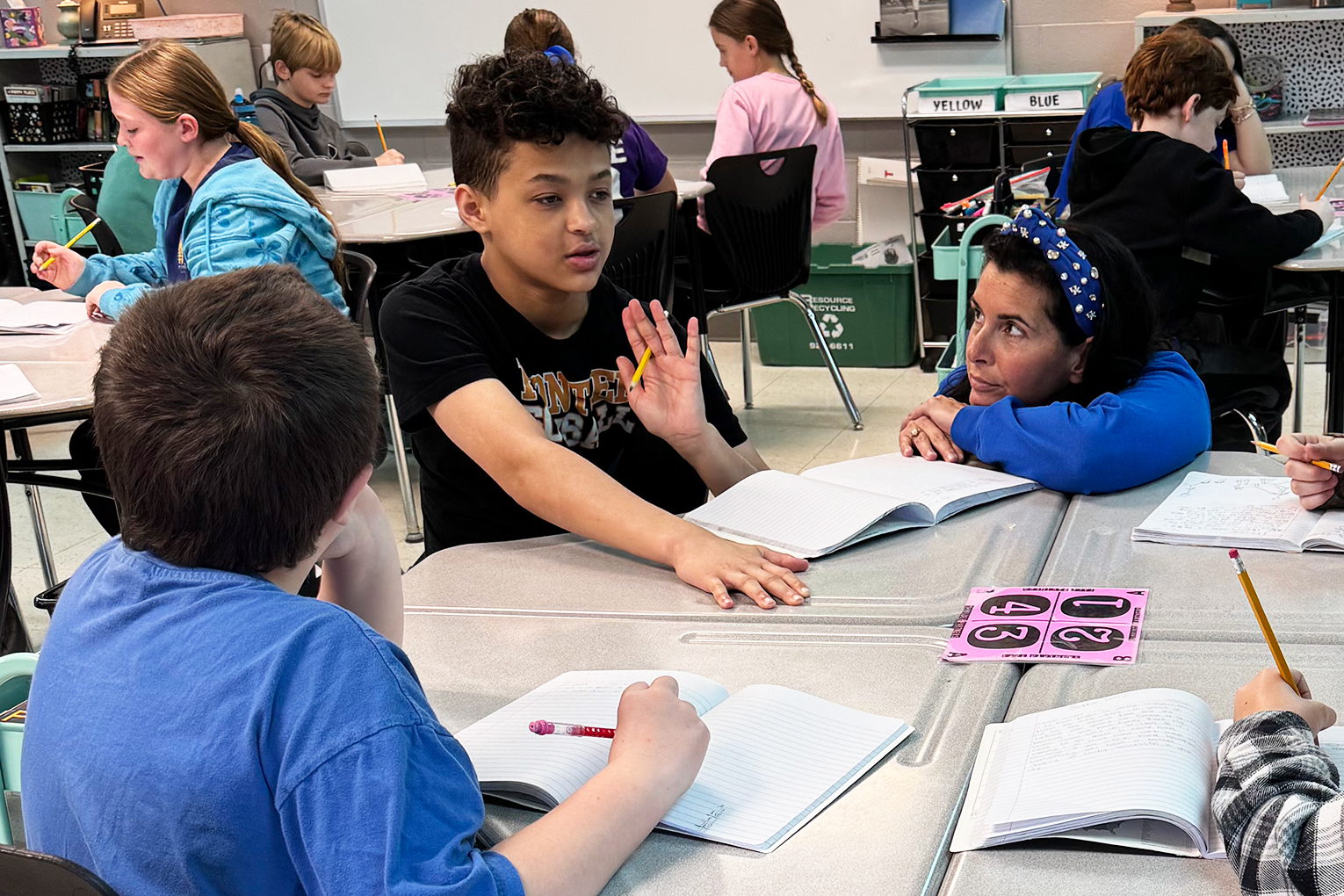
Simpson Elementary Librarian Sam Northern spent seven days exploring Antarctica as part of the Grosvenor Teacher Fellow program sponsored by National Geographic and Lindblad Expeditions.
Photo provided by Sam Northern
By Brenna R. Kelly
Brenna.kelly@education.ky.gov
As Sam Northern explored the icy waters and snowy banks of Antarctica, where he encountered whales and walked among penguins, his students were always in the back of his mind.
“My students have been intensely interested in Antarctica and other remote destinations ever since I learned of my acceptance in the program,” said Northern, the librarian at Simpson Elementary (Simpson County).
He wanted to capture every moment of his expedition as a 2016 Grosvenor Teacher Fellow to share with his students when he returned. Northern used a 360-degree camera to photograph the icy waters and terrain and came home with a virtual reality viewer.
“My students were looking at the pictures I took and they were walking in a complete circle and up and down and they could see everything I saw,” he said.
Northern was one of 35 teachers from across the country selected for the professional development program, which is partnership of Lindblad Expeditions and National Geographic Education. The fellowship, which covers all costs, is designed help teachers bring geographic awareness to their schools and communities.
But Northern is sharing his experience through more than just photographs. He’s created interdisciplinary lessons about Antarctica that will help his students develop skills they will use in every content area.
“Students today need to learn skills that are inquiry-based for many subjects. They have to explore, investigate; it’s not just memorizing content anymore,” Northern said. “That’s perfect for the library, because you’re not supposed to know everything. I don’t know everything in these books, but I know how to use the books to find the information.”
“There are so many tools from the library that you can integrate into geography,” he said, including interactive map makers, atlases, books and websites.
Getting to experience a professional learning opportunity such as the Grosvenor Fellowship can be very beneficial to school librarians, said Kathy Mansfield, Kentucky Department of Education library media consultant.
“Librarians work with every child in a school and support every content area,” she said. “These types of experiences help school librarians to strengthen their collection of tools and resources they provide to the school community.”
But school librarians often miss out on these types of opportunities because many programs say that they are open to classroom teachers and librarians might not think they qualify, Mansfield said. Kentucky school librarians are certified teachers and if they inquire, she said, they might find out they are eligible for many more opportunities. Northern was one of two librarians to win the 2016 fellowship.

On Sam Northern’s first day in Antarctica, he explored Half Moon Island, one of the South Shetland Islands just north of the Antarctic Peninsula. On the island, Northern encountered Weddell seals and chinstrap penguins.
Submitted photo by Sam Northern
Northern learned about the Grosvenor program during another overseas trip in 2014. During his four weeks in Chinas as part of the Fulbright-Hays Summer Seminars Abroad Program, a fellow teacher on the trip mentioned the Grosvenor fellowship.
“The idea of getting to go to a remote location where normally you’d never get to go was exciting,” he said. “And having a program that was sponsored by National Geographic, I knew it was going to be worth the investment (of time).”
He applied in December 2015 and in February, National Geographic called with the good news. When he applied, Northern didn’t specify which expedition he would prefer. The fellows can get assigned to Arctic, British and Irish Isles, Canadian Maritimes, Iceland, the Galapagos or Antarctica.
“I just said I was available for everything, I wanted to help my chances,” he said. But Northern was thrilled with his assignment.
Before the trip, Northern spent four days in Washington, D.C., being trained in photography, Google’s virtual reality and what to expect. He left on Dec. 17 and flew to Argentina, where he boarded the National Geographic Explorer, a 367-foot long ship that would be home for the expedition. Two other teacher fellows – both science teachers – were aboard, along with other passengers on vacation.
After about two days at sea, the ship arrived in the Antarctica waters and for the next six days, Northern hiked on glaciers, kayaked among leopard seals, visited penguins and watched humpback and killer whales surface in the icy waters.
“You never knew what was going happen each day really,” he said.
Though there was an itinerary, it would change depending on if the ice was too thick or if wildlife was spotted nearby. Northern saw five species of penguins, three species of whales and three species of seals.
“If you’ve never heard a seal make noise, it is weird. It sounds like outer space, like an alien invasion. I’ve never heard anything like it,” he said.
Though it’s the coldest continent, Northern visited during the southern hemisphere’s summer, so temperatures ranged between 30 and 40 degrees. That doesn’t mean he didn’t get cold. As part of a polar plunge, Northern jumped into the 29-degree water wearing only a T-shirt and swim trunks.
“On Christmas, it actually snowed,” he said. “It was the only time, so it’s kind of nice that it happened on Christmas.”
While on the journey, Northern kept a journal that would become a blog and worked on lessons for his library classes.
Now the 670 students Northern sees each week are learning science, social studies, English and library media skills by exploring Antarctica.
For one project, students are writing books, plays or comic books about an Antarctic animal who leaves to go to another continent to meet other animals. Students have to research the animals and habitats, and compare and contrast them. In another lesson, students measure the length of Antarctic animals and compare them to other animals by marking their length on the floor of the library. Students were surprised to learn that a humpback whale wouldn’t even fit in the room.
“I just want them to get the idea about how diverse that place is and I’m hoping later to connect it to the diversity in our own community and the wildlife that lives here,” Northern said. “I want to eventually bring it back home.”
Northern is also planning to create lessons on the environment to show students the pristine landscape of Antarctica and explore how Kentucky’s landscape developed into cities and towns.
“I want to do as many interdisciplinary projects as I can to create a more well-round student body, it gets them to understand that the library is not just one thing,” he said. “Every subject is somehow embedded in the library.”
MORE INFO …
Sam Northern Sam.Northern@Simpson.kyschools.us
Kathy Mansfield Kathy.Mansfield@education.ky.gov









Leave A Comment